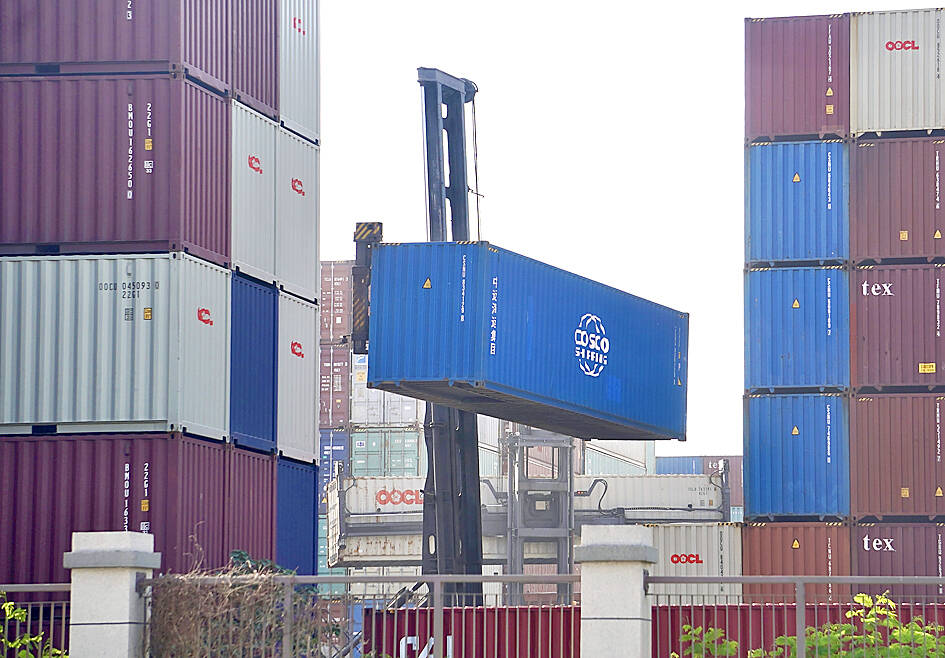The Ministry of Economic Affairs is to expand the scope of restrictions on exports to Russia and Belarus by adding nitrocellulose to its list of controlled items, effective from Friday next week.
Nitrocellulose, a highly flammable thermoplastic resin, is an essential component in smokeless gunpowder and ammunition propellant.
It has already been regulated by the US and the EU, the International Trade Administration said in a statement on Monday.

Photo: CNA
The inclusion of nitrocellulose comes after Taipei on March 8 added 77 items to its list of machine tools prohibited from being exported to Russia and Belarus in a bid to prevent the Russian military from using Taiwan’s high-tech products in its war in Ukraine.
Taiwan already imposes export restrictions on nitrocellulose with a nitrogen concentration in excess of 12.2 percent, but nothing below that, the trade agency said.
The decision to control exports of all nitrocellulose is necessary to prevent “a regulatory loophole,” it said.
Taoyuan-based TNC Industrial Co (台硝化工) is the only company in Taiwan that produces nitrocellulose with a nitrogen concentration below 12.2 percent, an official at the trade agency said.
The company’s thermoplastic resins are mainly shipped to the US, Japan and Vietnam for use as adhesives in metal, wood and leather products, said the official, who spoke on condition of anonymity.
In addition, the fine imposed on first-time offenders for exporting restricted items to Russia and Belarus has been increased to NT$1 million (US$30,979), the ministry said.
Meanwhile, the ministry called on businesses to comply with domestic and international export control regulations, fulfill their due diligence requirements and avoid contravening regulations, which would protect their business reputation, as well as their own rights and interests.
Ukraine’s Central Scientific Research Institute of Armament and Military Equipment said that nitrocellulose with a nitrogen concentration of only 11.5 percent is sufficient to produce smokeless gunpowder.
The information was disclosed after an inquiry by a European security research think tank in late April.

Nvidia Corp chief executive officer Jensen Huang (黃仁勳) on Monday introduced the company’s latest supercomputer platform, featuring six new chips made by Taiwan Semiconductor Manufacturing Co (TSMC, 台積電), saying that it is now “in full production.” “If Vera Rubin is going to be in time for this year, it must be in production by now, and so, today I can tell you that Vera Rubin is in full production,” Huang said during his keynote speech at CES in Las Vegas. The rollout of six concurrent chips for Vera Rubin — the company’s next-generation artificial intelligence (AI) computing platform — marks a strategic

REVENUE PERFORMANCE: Cloud and network products, and electronic components saw strong increases, while smart consumer electronics and computing products fell Hon Hai Precision Industry Co (鴻海精密) yesterday posted 26.51 percent quarterly growth in revenue for last quarter to NT$2.6 trillion (US$82.44 billion), the strongest on record for the period and above expectations, but the company forecast a slight revenue dip this quarter due to seasonal factors. On an annual basis, revenue last quarter grew 22.07 percent, the company said. Analysts on average estimated about NT$2.4 trillion increase. Hon Hai, which assembles servers for Nvidia Corp and iPhones for Apple Inc, is expanding its capacity in the US, adding artificial intelligence (AI) server production in Wisconsin and Texas, where it operates established campuses. This

US President Donald Trump on Friday blocked US photonics firm HieFo Corp’s US$3 million acquisition of assets in New Jersey-based aerospace and defense specialist Emcore Corp, citing national security and China-related concerns. In an order released by the White House, Trump said HieFo was “controlled by a citizen of the People’s Republic of China” and that its 2024 acquisition of Emcore’s businesses led the US president to believe that it might “take action that threatens to impair the national security of the United States.” The order did not name the person or detail Trump’s concerns. “The Transaction is hereby prohibited,”

Garment maker Makalot Industrial Co (聚陽) yesterday reported lower-than-expected fourth-quarter revenue of NT$7.93 billion (US$251.44 million), down 9.48 percent from NT$8.76 billion a year earlier. On a quarterly basis, revenue fell 10.83 percent from NT$8.89 billion, company data showed. The figure was also lower than market expectations of NT$8.05 billion, according to data compiled by Yuanta Securities Investment and Consulting Co (元大投顧), which had projected NT$8.22 billion. Makalot’s revenue this quarter would likely increase by a mid-teens percentage as the industry is entering its high season, Yuanta said. Overall, Makalot’s revenue last year totaled NT$34.43 billion, down 3.08 percent from its record NT$35.52